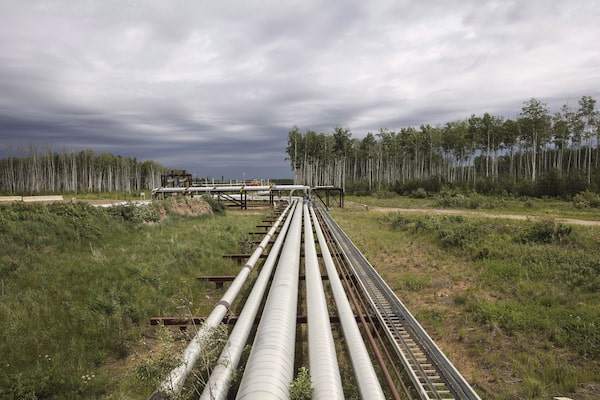
Suncor pipes that carry various liquids from their MacKay River pad in the oil sands in Fort McMurray, Alberta, June 12, 2017.JASON FRANSON/The Canadian Press
Investors who have aligned their portfolios with environmental, social and governance principles had it easy when renewable energy stocks were soaring last year and traditional energy was in the dumps. ESG delivered, and handily.
But the two sectors have switched roles in 2021, offering a challenge to green-leaning investors. Will ESG’s popularity persist if returns lag?
The reversal is one of the defining features of Canadian stock market returns so far this year. The S&P/TSX Composite has been chugging along at a brisk pace: The index is up 7.5 per cent in 2021, outperforming the 4.1 per cent gain for the S&P 500 over the same period.
You can thank energy stocks, which are a big component of the Canadian benchmark and driven largely by the recovering price of crude oil, which is now at more than US$64 a barrel.
Suncor Energy Inc. is among the leaders in the index, with a gain of 31 per cent since the start of the year. Canadian Natural Resources Ltd. is not far behind with a return of 29 per cent.
Neither stock is embraced by most environmentally conscious investors, given the companies’ expansive oil sands operations. Norway’s US$1.3-trillion sovereign wealth fund last year divested itself from 15 global companies, including Suncor and Canadian Natural Resources, over what the fund called “ethical or sustainability reasons.”
But renewable energy companies, which own and develop wind, solar and hydroelectric assets globally and tend to be well aligned with ESG principles, are now struggling after a strong 2020. Northland Power Inc. has fallen 5 per cent in 2021, trailing both the TSX and oil producers. Innergex Renewable Energy Inc. has fallen nearly 19 per cent.
This is part of a broader pause: The iShares Global Clean Energy ETF, an exchange-traded fund that tracks 30 stocks associated with renewable energy, is down 14.5 per cent in 2021 after rising more than 140 per cent last year amid tremendous investor enthusiasm for all things green.
The recent divergence with oil producers has a number of sources, starting with the price of oil. The global economic recovery has driven up the price of West Texas Intermediate, a North American crude oil benchmark, by about 30 per cent since the start of the year, restoring oil producer confidence.
One example of this confidence: When Canadian Natural Resources reported its fourth-quarter financial results last week, it estimated that it will generate between $4.9-billion and $5.4-billion in free cash flow this year, or more than seven times the company’s cash flow in 2020. It underscored this upbeat outlook by raising its quarterly dividend by 11 per cent.
Analysts say stocks of traditional energy companies have low valuations despite the recent run-up, which also helps explain the recent divergence – oil producers are cheap, renewable energy stocks are not. A renewable energy stock like Algonquin Power & Utilities Corp. trades at 24 times reported earnings per share, while Suncor trades below 11 times trailing earnings.
Based on estimated earnings, oil producers look even cheaper. According to figures from CIBC World Markets, Suncor trades at just 3.5 times estimated 2022 earnings, while analysts’ estimates put the price-to-earnings ratio for Algonquin above 19.
Lastly, oil producers may be benefiting from a rotation in the stock market this year. Rising bond yields are encouraging investors to move from previous winners (such as technology stocks and renewable energy players) to stocks that stand to benefit from rising interest rates and stronger economic activity – and traditional energy is clearly an economically sensitive sector.
Of course, renewable energy has a lot going for it. As the developed world focuses on reducing carbon emissions, the long-term growth prospects for wind and solar energy are strong. As well, the sector is clearly aligned with at least the “E” in ESG principles.
But it was easy to embrace these principles when they translated into market-beating returns. Now that fossil fuels are gaining traction and look increasingly attractive as the pandemic recedes, renewables may find it more difficult to gain attention.
Be smart with your money. Get the latest investing insights delivered right to your inbox three times a week, with the Globe Investor newsletter. Sign up today.
 David Berman
David Berman